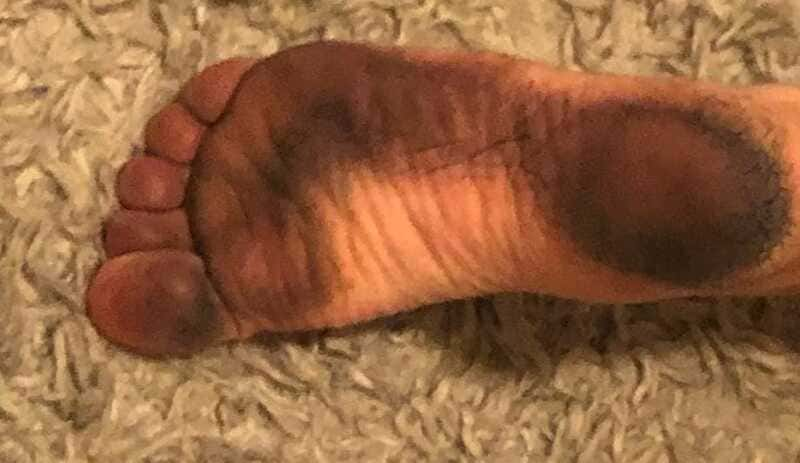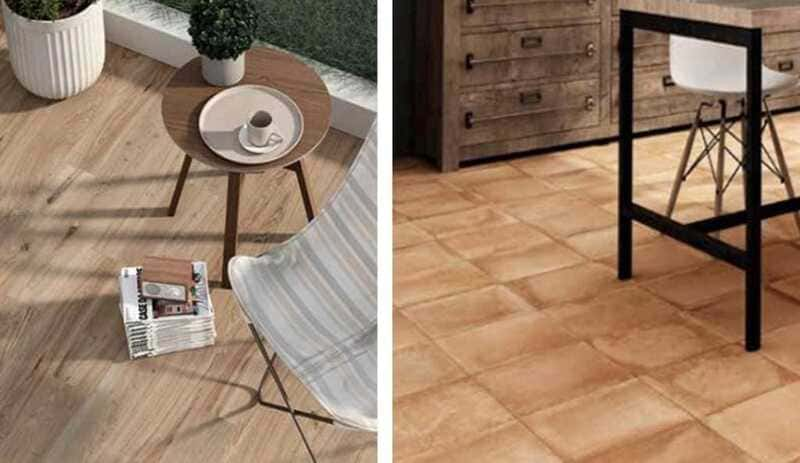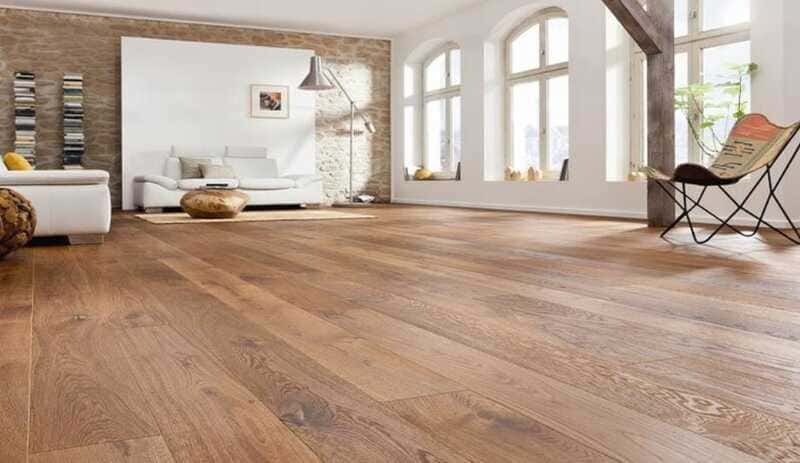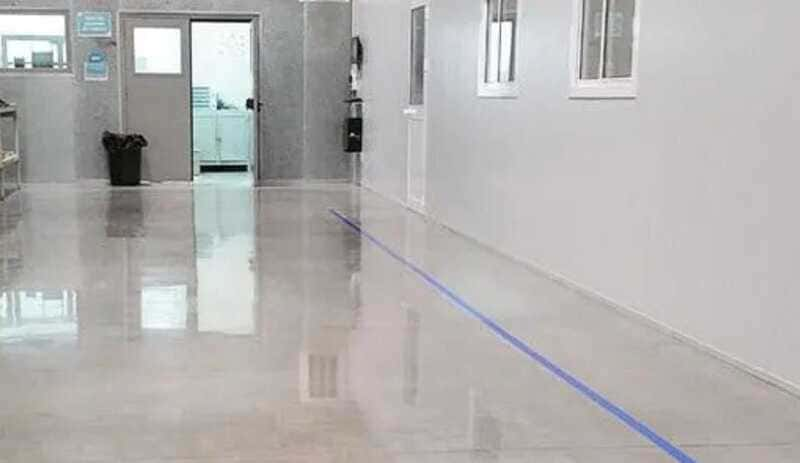If you have ever noticed that your feet turn black after walking barefoot on a floor, you may have wondered what causes this phenomenon. Foot blackening from the ground is a common problem that can be disconcerting and annoying.
Fortunately, there are ways to avoid this problem and keep your feet clean and healthy. In this article, we will explore the possible causes of why my floor does makes my feet black? As well as the types of soils that can cause this problem.

We will also discuss how to prevent soil from blackening your feet and provide some home remedies to eliminate blackened feet caused by soil. Read on to learn more about this common problem and how to fix it.
Causes of blackening of the feet by the ground.
In order to determine why my floor does makes my feet black? We must first pay attention to the causes of this phenomenon. The blackening of the feet from the ground can have several causes. One of the most common causes is the accumulation of dirt and dust on floors, especially those that are not cleaned frequently. When we walk barefoot on these floors, dirt and dust stick to our feet and can blacken them.
Another common cause of soil blackening of the feet is the presence of fungi and bacteria in the soil. Fungi and bacteria can grow in moist, warm environments, which includes many types of soil. If we walk barefoot on soil that harbors fungi and bacteria, these organisms can transfer to our feet and cause blackening.
Wearing dirty or improperly cleaned shoes can also contribute to soil blackening of the feet. If shoes are soiled on a blackened floor and then worn on a clean surface, dirt and dust particles can be transferred to the new surface, including the feet.
Finally, some people may be more prone than others to develop foot blackening from soil due to factors such as skin composition and amount of sweating. People who sweat more or who have a greater propensity for the accumulation of dead skin cells may be more susceptible to ground-in foot blackening.
Types of soils that can blacken the feet.
To talk about why my floor does makes my feet black. We must make special emphasis on the types of soils that promote this phenomenon. There are several types of soils that can blacken feet. One of the most common is tile or ceramic flooring, especially if it is not cleaned frequently. Dirt and dust can accumulate in the joints between the tiles, which can cause feet to blacken when walking barefoot on it.

Wood flooring can also be a problem, especially if not cleaned properly. Wood is porous and can retain moisture, which can promote the growth of fungi and bacteria. If we walk barefoot on a contaminated wood floor, we can transfer fungi and bacteria to our feet and cause blackening.

Concrete flooring can also blacken feet, especially if it is not sealed properly. Concrete is porous and can absorb dirt and dust, which can transfer to the feet when walking barefoot on it.

Finally, carpet floors can also be a problem for some people. Carpets can trap dirt and dust, and feet can become blackened when walking on them barefoot.
Why do some soils blacken my feet and others do not?
The reason why my floor does makes my feet black? Can be very diverse. Floors that do not blacken feet are those that are clean and well maintained. If they are cleaned regularly, dirt and dust that could accumulate and cause black feet are removed. In addition, floors that are sealed or treated with a moisture-resistant finish are less likely to blacken feet.
In contrast, floors that blacken feet are those that have a greater accumulation of dirt and dust, as well as higher humidity. This can be especially common in bathrooms and kitchens, where floors are exposed to more water and moisture than in other areas of the home. Wood floors can also blacken feet more easily due to their porosity and ability to absorb moisture.
In addition, some floors may be more prone to harboring fungi and bacteria, which can increase the likelihood of blackened feet when walking on them barefoot. Therefore, it is important to pay attention to the cleanliness and maintenance of floors to prevent the buildup of fungus and bacteria.
It is also important to note that the propensity of floors to blacken feet can vary from person to person. Some people may have increased sweating or a greater accumulation of dead skin cells, which can increase their susceptibility to foot blackening on any type of flooring.
Is blackening of the feet on the floor dangerous?
Floor blackening can be an unsightly and annoying problem, but in most cases it does not pose a health risk. Blackening is simply a buildup of dirt and dust on the skin of the feet and can be easily removed by washing.
However, in some situations, blackening of the feet may be a sign of a more serious problem. For example, if the dirt on the floor is due to the presence of fungus or bacteria, this can lead to infections on the skin of the feet, especially if cuts or wounds are present.
In addition, some materials used in the manufacture of flooring, such as adhesives and sealants, may contain toxic substances such as formaldehyde, which can cause skin irritation and other health problems. Therefore, if foot blackening occurs on a new or newly installed floor, it may be due to the presence of toxic substances in the floor.
In extremely rare cases, blackening of the feet may be a sign of an underlying disease, such as Addison’s disease or Wilson’s disease. These diseases affect the endocrine system and liver, respectively, and can cause changes in skin pigmentation.
In general, if the blackening of the feet from the ground is not accompanied by any other symptoms or health problems, it is not a cause for concern. However, if there are signs of infection or skin irritation, or if the blackening occurs on new or newly installed flooring, it is advisable to seek medical attention to rule out any underlying problems.
How to avoid floor blackening of the feet.
Although floor blackening can be a common problem, there are several measures that can be taken to prevent it.
The first preventive measure is to keep the floor clean. Dirt and dust that accumulate on the floor are the main cause of foot blackening, so it is recommended that the floor be swept, vacuumed or mopped regularly to keep it clean.
In addition, it is important to choose the right footwear. Shoes that are too big or too small can cause the feet to rub against the floor, which increases the risk of blackening. It is advisable to wear shoes that fit well and are comfortable to walk in.
It is also advisable to avoid walking barefoot on floors that may blacken the feet. Concrete, stone or asphalt floors are especially prone to accumulate dirt and dust, so it is best to wear shoes or slippers at all times.
Another preventive measure is to use mats or rugs in high-traffic areas. These can help reduce the amount of dirt and dust that accumulates on the floor, which in turn reduces the risk of foot blackening.
If you have a new or newly installed floor, it is advisable to make sure that the materials used are safe and do not contain toxic substances that can irritate or damage the skin of the feet.
Home remedies to remove foot blackening caused by soil.
Blackened feet caused by soil can be an annoying problem, but there are several home remedies that can be used to remove it. Here are a few options:
Baking soda: mix baking soda with water to a paste and rub your feet with it for several minutes. Then, rinse with warm water and dry carefully.
Lemon: cut a lemon in half and rub your feet with the inner part of the fruit. Leave on for a few minutes and then rinse with warm water.
White vinegar: mix one part white vinegar with three parts warm water and soak your feet in the solution for a few minutes. Then rinse with warm water and dry thoroughly.
Coconut oil: massage your feet with coconut oil for several minutes and leave it on for an hour. Then, rinse with warm water and dry carefully.
Salt and olive oil: mix salt and olive oil to obtain a paste and rub your feet with it for several minutes. Then rinse with warm water and dry thoroughly.
It is important to remember that these home remedies can help eliminate foot blackening, but it is also important to take preventive measures to avoid re-darkening, such as keeping the floor clean and wearing appropriate footwear. If the blackening persists or causes pain or irritation, it is advisable to consult a dermatologist for proper diagnosis and treatment.
